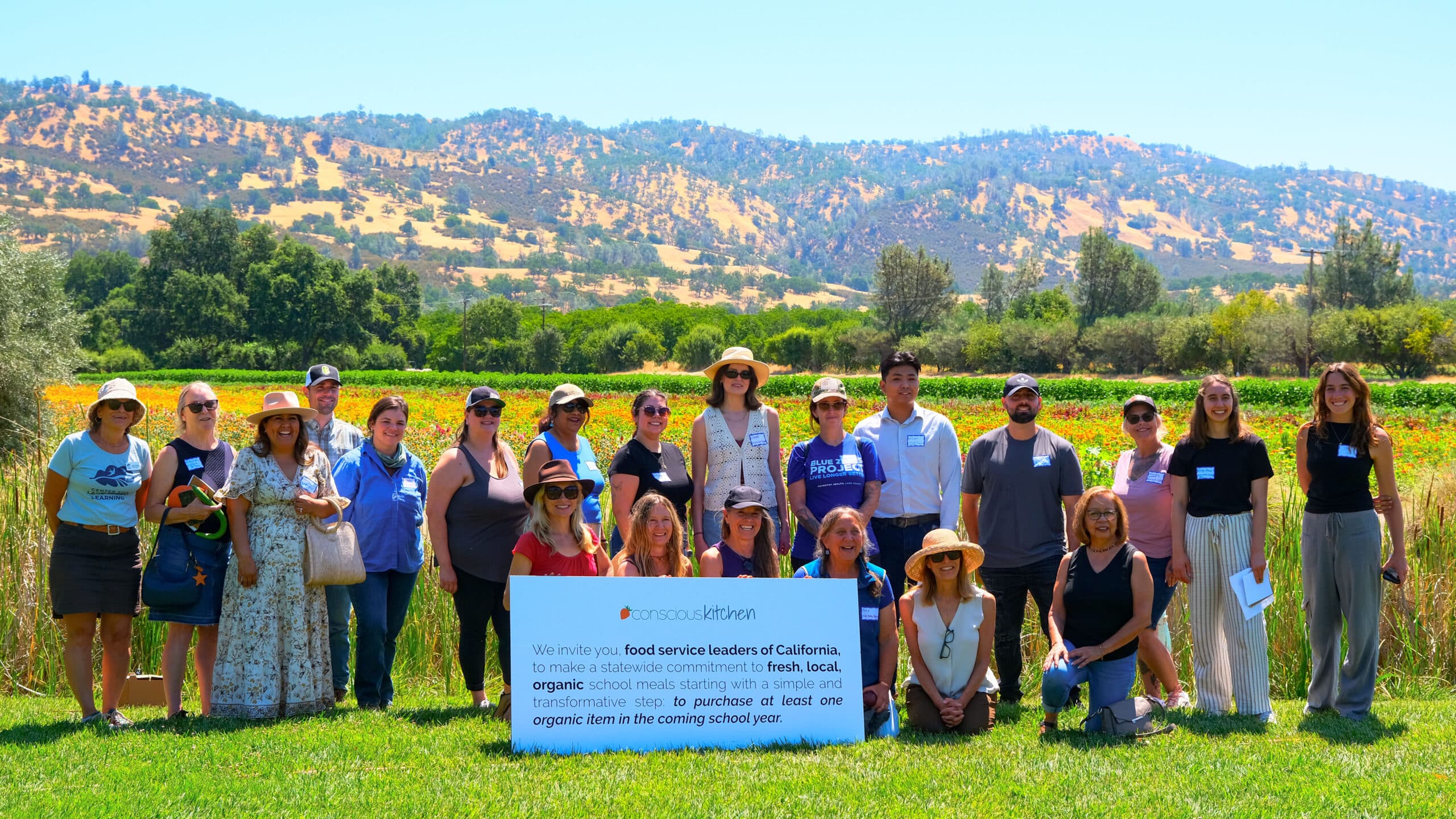During the summer of 2025, Conscious Kitchen set out on the Organic Farm-to-School Road Tour to connect small and mid-sized organic farms with school districts across California. With a vision of providing every student in the state with fresh, local, and organic food, this initiative invites school food service leaders, farmers, and community partners to come together, share stories, and explore how we can overcome the challenges in sourcing better food for our kids. Each stop on the tour is an opportunity to dive deeper into the issues at hand, learn from one another, and strengthen the partnerships that are shaping the future of school meals. Here’s a look at one of our recent gatherings on the road and the incredible conversations that are moving us toward a healthier, more sustainable food system for California’s students.
Road Tour Stop #3: Full Belly Farm
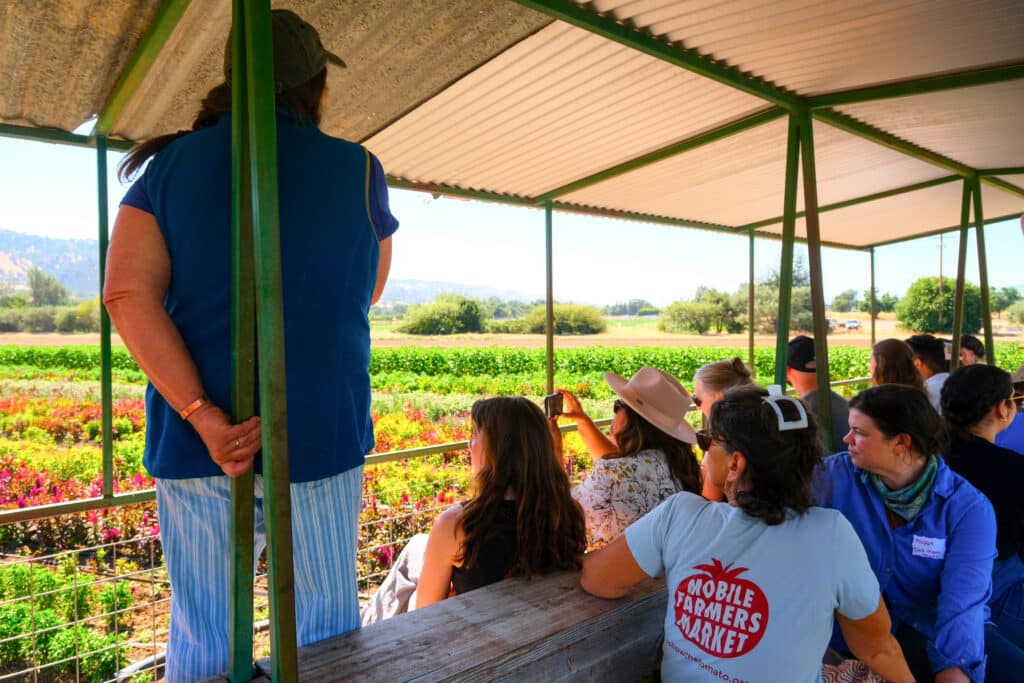
For the first time, Conscious Kitchen ventured into the Central Valley/Sacramento region for an unforgettable gathering at Full Belly Farm. Nestled in the stunning Capay Valley, Full Belly has long been a friend and partner to Conscious Kitchen — and this was a special opportunity to connect with new stakeholders in the region. The day was filled with inspiration, new relationships, and a shared commitment to bringing more organic food to California’s students.
The day began with a farm tour led by Dru Rivers, one of the farm’s owners, who offered a glimpse into the heart of Full Belly’s operations. From specialty items like organic flowers and heirloom varieties of wheat, to delicious melons that are carefully planted to ensure a steady supply into the fall, Full Belly is a testament to what is possible through a deep commitment to sustainability on all levels, the soil, environment, farmworkers, local food economies, vibrant food, greater community, and generations to come.
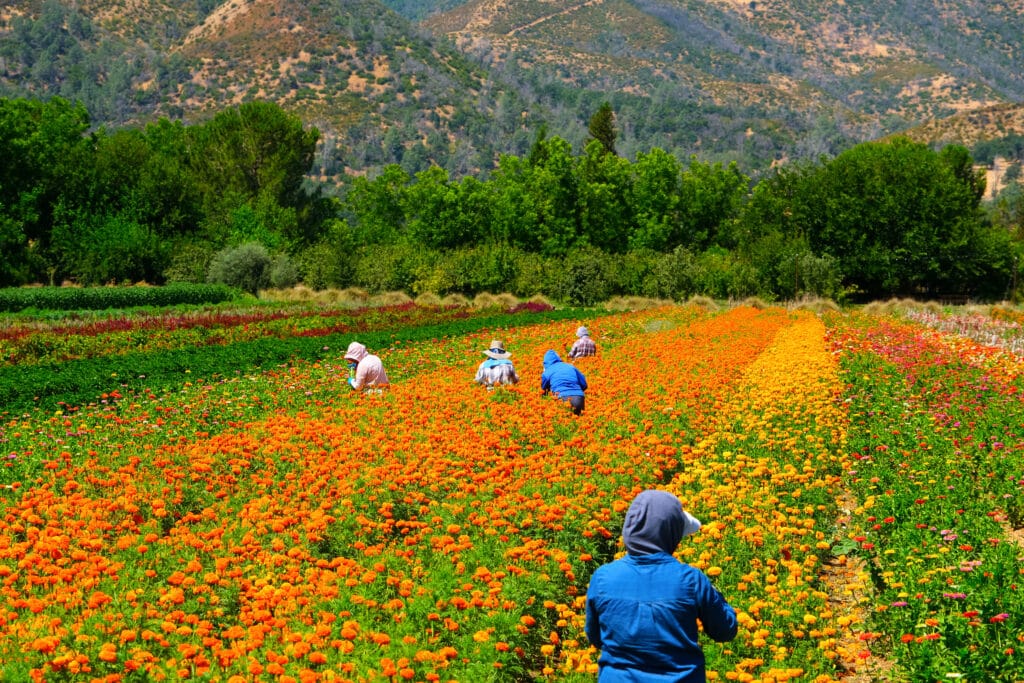
As we took it all in by tractor, Dru spoke passionately about the farm’s dedication to its workers, many of whom have been with Full Belly for over 30 years. “Farm labor and fair wages are important conversations that we prioritize,” she shared, underscoring the farm’s commitment to its people. Full Belly is not just about growing food; it’s about fostering a culture of respect, fairness, and sustainability.
And nourishing the next generation is at the heart of their work. One of the farm’s signature crops — carrots — perfectly reflects this commitment. Winters Unified School District, just down the road from the farm, has been serving Full Belly’s carrots for years, and students rave about them. In fact, many children hadn’t even eaten carrots until they tried these organic ones, a true testament to the farm’s quality and the impact it has on flavor.
Overcoming Challenges
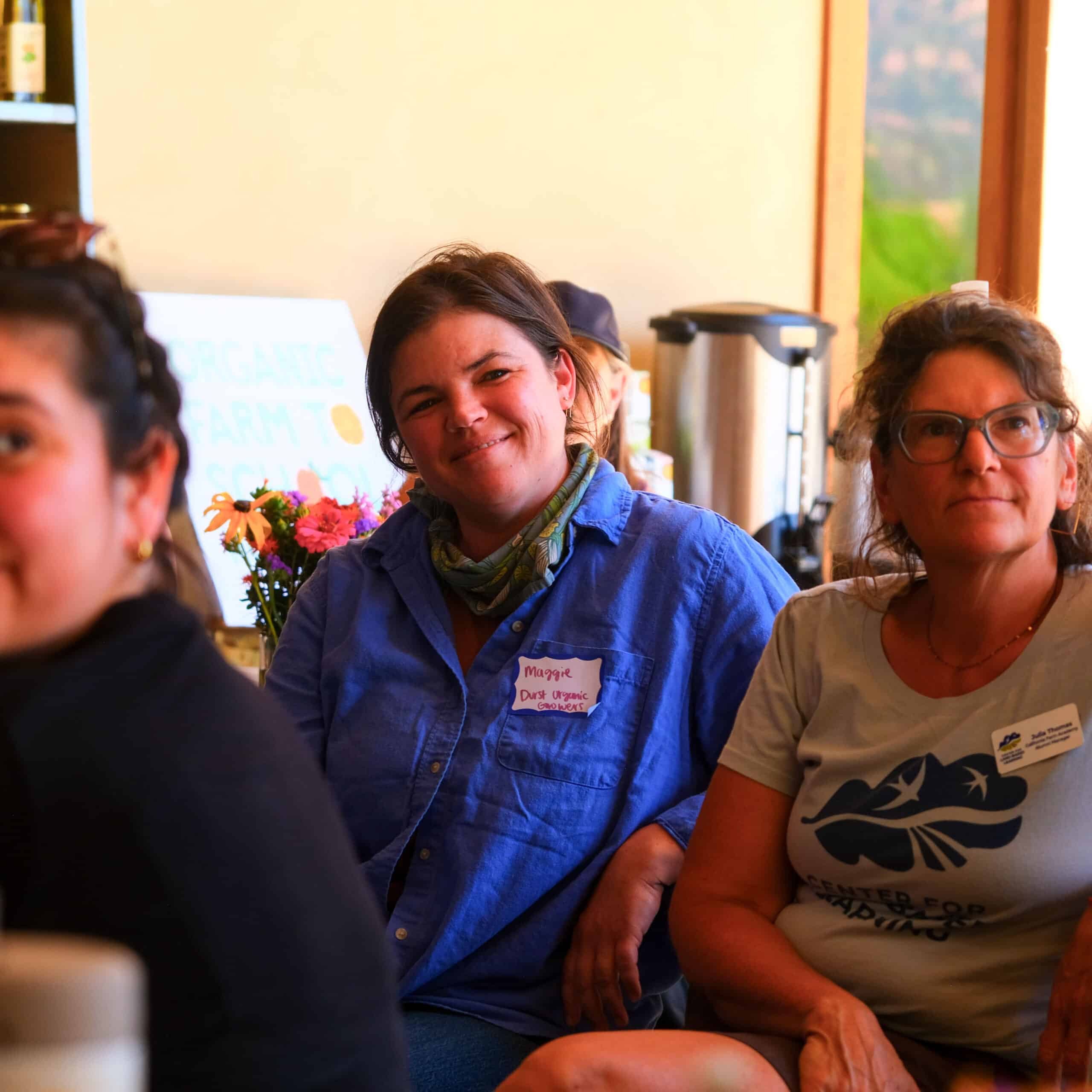
We gathered for a group discussion that brought together farmers, food service leaders, and community partners to connect, ask questions, and build partnerships. Jim Durst, the farmer behind Durst Organic Growers, shared a powerful reminder for food service leaders: “If you want specific crops, you have to plan with your farmer.” Communication is key. If schools want consistent access to strawberries in April, for example, they need to talk to farmers well in advance. He pointed out that larger districts can lock in crop contracts, giving farmers the security they need to plant accordingly, echoing a similar discussion to one at the Conscious Kitchen Central Coast gathering.

Logistics is always top of mind: how to address the barriers to getting organic food into schools in a consistent, cost-effective way. While farmers across the region are ready and willing to supply fresh local produce, distribution remains a barrier. For small farms, especially those in more rural areas like the Capay Valley, getting food into multiple school districts can present logistical challenges.
Funding is also a concern, especially as schools navigate a shifting landscape of funding sources. Lael Gerhart from Frog Hollow Farm discussed the DoD Fresh program and the need to strategically plan for funding gaps. “Trying to figure out the buckets and where the money is… we’re making those strategic choices to maximize local and organic,” she said. It’s clear that creative solutions and proactive planning are key to maintaining momentum and viability in farm-to-school efforts. In California, we are fortunate to have strong support for such initiatives at the state level, underscored by the presence of Elijah Navarro from the office of Senator Christopher Cabaldon.
Building Stronger Connections
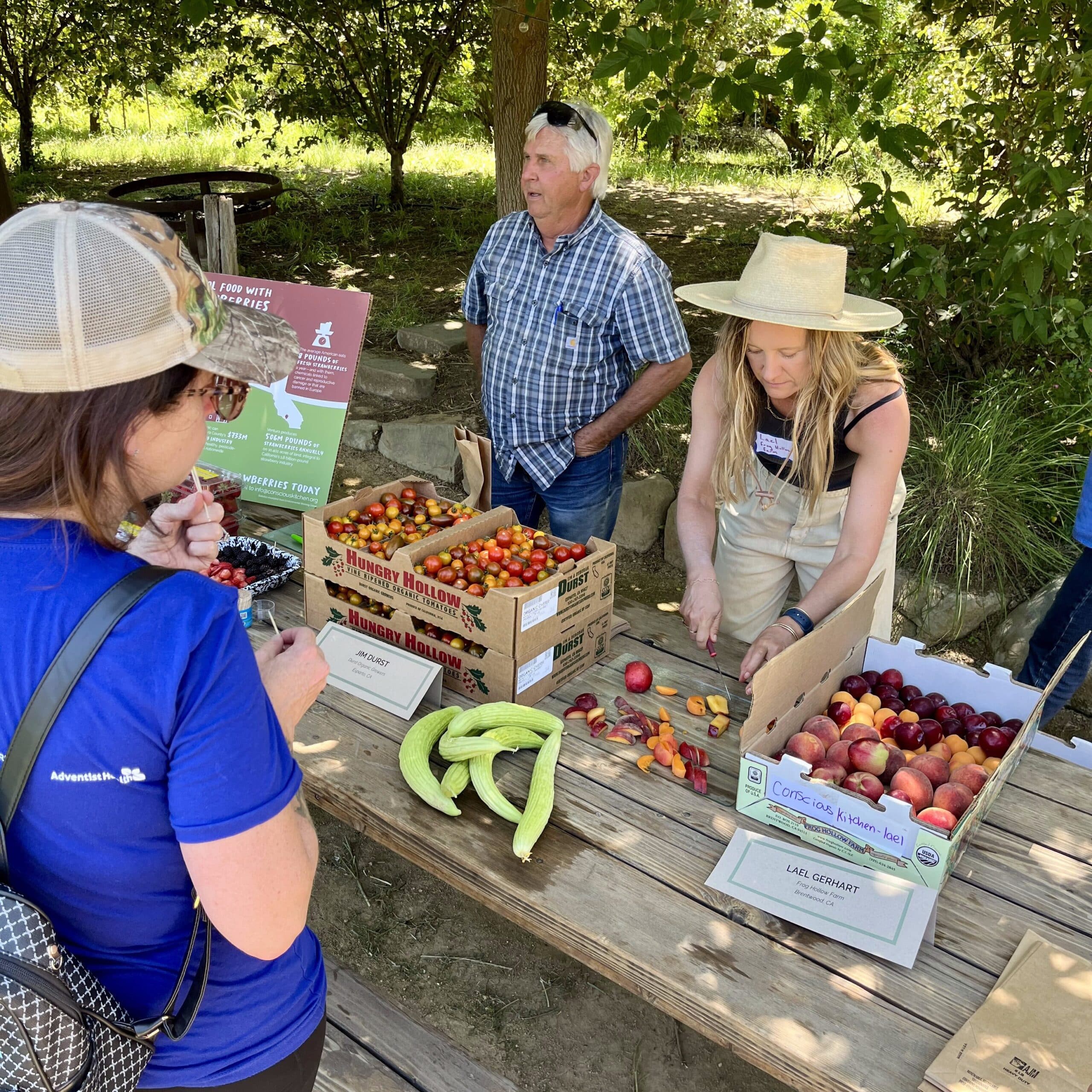
As the day came to a close, we gathered for a beautiful Producer Marketplace, where farmers showcased the vibrant, organic produce that will soon make its way into school dining halls. It was a chance for food service leaders to taste the difference of fresh, local, organic produce.
“If we’re going to get kids to eat good food, it has to taste good. When it comes straight from the farm, you know it’s fresh,” Cathy Olson with Winters Unified School District knows firsthand just how much taste and freshness matter.
Our day at Full Belly Farm was a perfect example of what can happen when farmers, food service leaders, and community partners come together to share knowledge, forge relationships, and plan for the future. We heard countless attendees talk about how they were walking away from the Conscious Kitchen gathering with a wealth of inspiration, new ideas, fresh partnerships, and renewed commitment to ensuring that California’s students have access to the best food possible.
